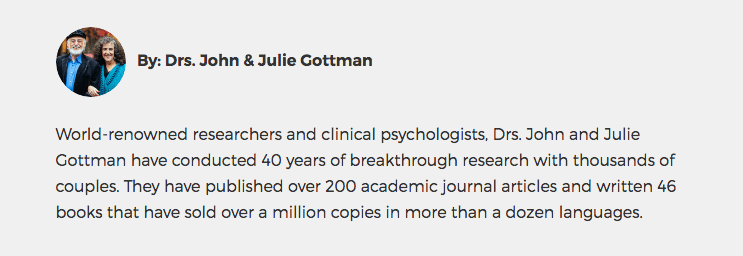Cover photo credit to The Gottman Institute Facebook page. The following article was originally posted on The Gottman Insitute’s relationship blog in April 2016. It has been edited for content and length, some hyperlinked articles were added by Fight the New Drug.
An Open Letter on Porn
By Drs. John and Julie Gottman
Pornography in relationships has been an issue for a long time. Even today, not every professional agrees on how and when porn is okay.
We attended one workshop in a couples therapy conference that recommended porn use because it’s natural and harmless. This may be an extreme view, but many clinicians have suggested that if a couple uses pornography to bring them closer, then porn use is fine. In fact, many professionals have thought it might increase relationship connection and intimacy.
Recently, however, research on the effects of pornography use, especially one person frequently viewing pornographic images online, shows that pornography can hurt a couple’s relationship. The effect may be true, in part, because pornography can be a “supernormal stimulus” (see Supernormal Stimuli by Deirdre Barrett). Nikko Tinbergen, a Nobel Prize-winning ethologist, described a supernormal stimulus as something that causes a much more exaggerated response than normal. One effect of a supernormal stimulus is that excitement is lessened in normal situations.
Pornography may be exactly like a supernormal stimulus. For example, a common sexual situation doesn’t reach the same level of reaction as a pornographic supernormal stimulus. In other words, after watching extraordinary sexual situations in porn, normal sex isn’t as exciting. Normal sex becomes much less interesting for porn users. The data supports this conclusion. In fact, use of pornography by one partner leads the couple to have far less sex and ultimately reduces relationship satisfaction.
There are many other factors about porn use that can threaten a relationship’s intimacy.
⌦ First, intimacy for couples is a source of connection and communication between two people. But when one person becomes accustomed to getting sexual release from porn, they are actually turning away from intimate interaction.
⌦ Second, when watching pornography, the user is in total control of the sexual experience. This is in contrast to normal sex, in which people are sharing control with the partner. Thus a porn user may form the unrealistic expectation that sex will be under only one person’s control.
⌦ Third, the porn user may expect that their partner will always be immediately ready to have sex (see Come as You Are by Emily Nagoski). This is unrealistic as well. Research has revealed that typical foreplay leads to a desire for sex only 10% of the time in women and 59% of the time in men.
⌦ Fourth, some porn users rationalize that pornography is okay if it does not involve partnered sexual acts and instead relies only on self-stimulation. While this may provide release, the relationship goal of intimate connection is ultimately lost.
Worse still, many porn sites include violence toward women, the exact opposite of intimate connection. Porn use can become an actual addiction with the same brain pattern activity as other addictions, like gambling (see Your Brain on Porn by Gary Wilson).
Pornography can also lead to a decrease in relationship trust and a higher likelihood of affairs outside the relationship. Many porn sites now offer an escalation of sexual activity beyond simply viewing porn that includes actually having sex with other individuals. Also, the support of porn use is reinforcing an industry that abuses the actors employed to create the pornography (see The Empire of Illusion by Chris Hedges).
We applaud major media outlets like Time Magazine that have joined the anti-pornography movement. Their 2016 April cover story titled Porn and the Threat to Virility (FTND note: which mentions Fight the New Drug!) dives into how modern men who grew up watching porn as children and teenagers have started a movement against it, hoping to shed light on the sexual material’s power to harm Americans and their relationships.
We are led to unconditionally conclude that for many reasons, porn poses a serious threat to couple intimacy and relationship harmony. This moment calls for public discussion, and we want our readers around the world to understand what is at stake.

This letter has been updated since its initial release in 2016. Click here to see the Gottmans’ original letter, and their subsequent additions.
Fight the New Drug collaborates with a variety of qualified organizations and individuals with varying personal beliefs, affiliations, and political persuasions. As FTND is a non-religious and non-legislative organization, the personal beliefs, affiliations, and persuasions of any of our team members or of those we collaborate with do not reflect or impact the mission of Fight the New Drug.
_____________________
This is why we fight.
This is exactly what Fight the New Drug is all about. Research shows how porn harms the people who watch it, their relationships, and society as a whole. We, as a non-religious and non-legislative nonprofit, exist to give visibility to that research and help consumers make an informed, educated decision about porn for themselves.
Ultimately, porn is anything but harmless entertainment. Science and research are showing this, and now society is catching up.
Need help?
For those reading this who feel they are struggling with pornography, you are not alone. Check out Fortify, a science-based recovery platform dedicated to helping you find lasting freedom from pornography. Fortify now offers a free experience for both teens and adults. Connect with others, learn about your unwanted porn habit, and track your recovery journey. There is hope—sign up today.
Fight the New Drug may receive financial support from purchases made using affiliate links.
Your Support Matters Now More Than Ever
Most kids today are exposed to porn by the age of 12. By the time they’re teenagers, 75% of boys and 70% of girls have already viewed itRobb, M.B., & Mann, S. (2023). Teens and pornography. San Francisco, CA: Common Sense.Copy —often before they’ve had a single healthy conversation about it.
Even more concerning: over half of boys and nearly 40% of girls believe porn is a realistic depiction of sexMartellozzo, E., Monaghan, A., Adler, J. R., Davidson, J., Leyva, R., & Horvath, M. A. H. (2016). “I wasn’t sure it was normal to watch it”: A quantitative and qualitative examination of the impact of online pornography on the values, attitudes, beliefs and behaviours of children and young people. Middlesex University, NSPCC, & Office of the Children’s Commissioner.Copy . And among teens who have seen porn, more than 79% of teens use it to learn how to have sexRobb, M.B., & Mann, S. (2023). Teens and pornography. San Francisco, CA: Common Sense.Copy . That means millions of young people are getting sex ed from violent, degrading content, which becomes their baseline understanding of intimacy. Out of the most popular porn, 33%-88% of videos contain physical aggression and nonconsensual violence-related themesFritz, N., Malic, V., Paul, B., & Zhou, Y. (2020). A descriptive analysis of the types, targets, and relative frequency of aggression in mainstream pornography. Archives of Sexual Behavior, 49(8), 3041-3053. doi:10.1007/s10508-020-01773-0Copy Bridges et al., 2010, “Aggression and Sexual Behavior in Best-Selling Pornography Videos: A Content Analysis,” Violence Against Women.Copy .
From increasing rates of loneliness, depression, and self-doubt, to distorted views of sex, reduced relationship satisfaction, and riskier sexual behavior among teens, porn is impacting individuals, relationships, and society worldwideFight the New Drug. (2024, May). Get the Facts (Series of web articles). Fight the New Drug.Copy .
This is why Fight the New Drug exists—but we can’t do it without you.
Your donation directly fuels the creation of new educational resources, including our awareness-raising videos, podcasts, research-driven articles, engaging school presentations, and digital tools that reach youth where they are: online and in school. It equips individuals, parents, educators, and youth with trustworthy resources to start the conversation.
Will you join us? We’re grateful for whatever you can give—but a recurring donation makes the biggest difference. Every dollar directly supports our vital work, and every individual we reach decreases sexual exploitation. Let’s fight for real love:




